Why Use Lead Generation Surveys?
Lead generation forms on webpages are undoubtedly an efficient way to collect data such as contact information about your prospects. These forms, however, typically fail to collect additional and useful data due to the fact that prospects are resistant to filling out a large amount of fields.
Consider an example in which your goal is to facilitate lead generation for a growing business. Hopefully, you have a database full of contacts that have opted in to providing you with their contact information. However, it’s probable that your database does not include contextual information, such as job title, job function, or the problem that the prospect is trying to solve.
While it’s certainly a necessity to obtain contact information from your prospects, it’s also extremely beneficial to dig into contextual information.
Ideally, you should be able to derive insights from information such as whether or not a contact is a key decision-maker, the exact pain points that your prospects are experiencing, the types of content that they prefer to receive, and whether or not they are ready to make a purchasing decision.
In order to get the most form fills, you’ll want to keep your lead generation forms as short as possible. That’s where lead generation surveys become a powerful mechanism for getting to know each and every prospect at a more granular level once you’ve received their contact information from a form.
Lead generation surveys — when leveraged in conjunction with lead generation forms — allow businesses to approach interactions with prospects armed with a complete picture of who the prospect is, and where they are in the purchasing decision.
In this article, we’ll address some lead generation survey best practices that enable businesses to capitalize on lead generation survey data and ultimately sell more efficiently.
Lead Generation Survey Best Practices
Frame your lead generation survey as a benefit to your respondent.
In order to receive as many responses as possible, you’ll want to show your prospects upfront that there is a benefit to filling out answers to your lead generation survey questions.
Usually, an email is the most successful method of distributing your survey. In the email, be sure to include a line such as the following:
“Please take a brief moment to fill out this survey so that we can assist you quicker and more efficiently!”
Ask questions that will inform you about the contact’s buying power.
In your lead generation survey, you’ll want to include questions such as:
- “Are you responsible for your department’s budget?”
- “In the next quarter, how likely are you to purchase a new solution?”
As a result of contacts responding to these questions, you’ll receive direct insight into their timeline for purchasing new solutions and whether or not you are in touch with the person that holds the purchasing power at their company.
If someone states they are responsible for their team’s budget, but also expresses that they have no plans to purchase a solution in the next quarter, you’ll know that the contact will require additional and consistent touches from your marketing department in order to stay relevant to them.
Ask questions that will paint a detailed picture of why the contact is in the market for a solution.
In your survey, ensure that you ask questions that will provide a clear and detailed understanding of why the contact is potentially shopping for a new solution.
A great way to accomplish this is to ask the contacts about the top challenges they are currently forced to deal with. Once you know their most prolific pain points, you can cater your messaging to their needs.
You can also directly ask your contacts what their goal is by interacting with you. Are they just interested in receiving educational content, or are they more interested in learning about the specific solution that you are offering?
Continue to stay in touch with your contacts after they purchase.
While lead generation surveys empower you to effectively serve your prospects due to the surveys’ contextual nature, your survey interactions with contacts from your database should not be sunsetted once they decide to purchase.
Instead, it’s imperative to leverage surveys throughout the customer lifecycle, as we’ve covered in the following resources:
- How to Use Customer Satisfaction Surveys the Right Way
- Using Net Promoter Scores to Boost Customer Satisfaction & Loyalty
- Best Practices for Measuring Customer Satisfaction
You can even leverage these Alchemer survey templates to get started:
Conclusion
Surveys should be leveraged throughout the customer lifecycle.
Lead generation surveys gather contextual information about your prospects so that you can optimize your interactions with them, and ultimately sell your products or services more effectively.
On the other hand, NPS, customer experience, and customer satisfaction surveys can reveal what your contacts think of their interactions with your business after they’ve purchased.




